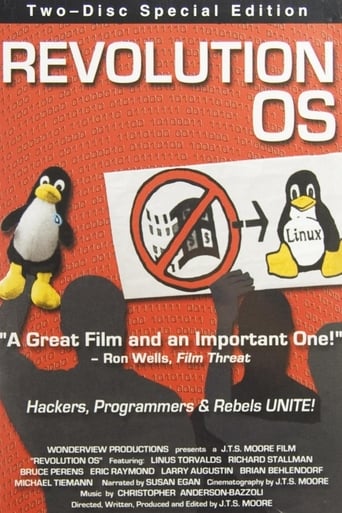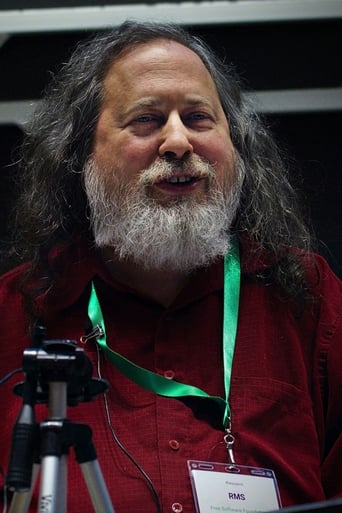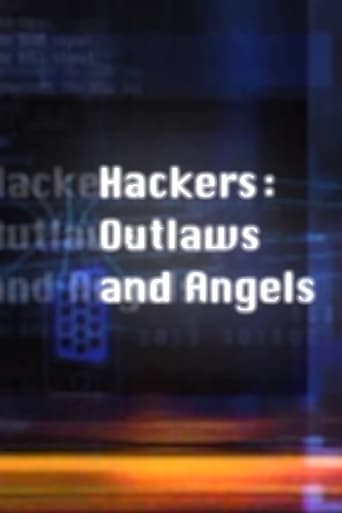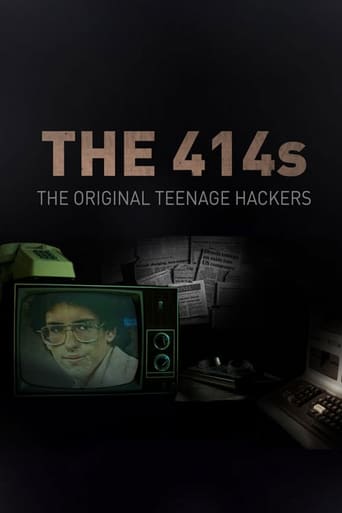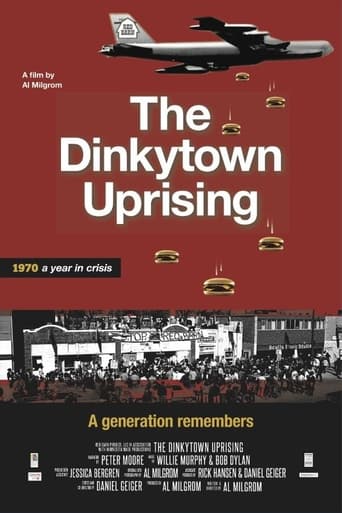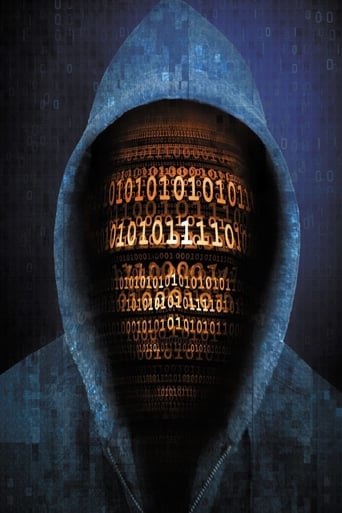Revolution OS (2001)
REVOLUTION OS tells the inside story of the hackers who rebelled against the proprietary software model and Microsoft to create GNU/Linux and the Open Source movement.
Watch Trailer
Free Trial Channels
Cast


Similar titles
Reviews
I saw this movie before reading any reviews, and I thought it was very funny. I was very surprised to see the overwhelmingly negative reviews this film received from critics.
I am only giving this movie a 1 for the great cast, though I can't imagine what any of them were thinking. This movie was horrible
Exactly the movie you think it is, but not the movie you want it to be.
One of the film's great tricks is that, for a time, you think it will go down a rabbit hole of unrealistic glorification.
If this really is a serious attempt for making a documentary it tries to cover so many areas that it should have been made a series instead. It fails to give a proper history of open source/free software. It fails to recreate the role of open source/free software during the period of focus, namely the dot com boom and crash of 1997-2001. It fails to give any new insights, even for the year it was made. And it fails miserably to have any kind of objectivity or dialogue.The value of this movie are the interviews with the key persons of the various open source and free software movements, though it becomes quite tiresome to sit and wait for the goodies. What really brings the credibility down is the overly hostile reading of the letter by Bill Gates and the traditional Microsoft bashing through the entire production, combined with the heroic soundtrack during the interviews of the "good guys". It gives the over all impression of really being a sales pitch for a church from a bunch of overly enthusiastic believers, though without the visionary parts that can make it a document of its context of production.In conclusion, even though far between, there are some good bits in this documentary that could make it worth watching if you have a special interest in the open source movement. Just be aware that you might also get some chills of embarrassment in between.
I've read 3 books related to the open source movement - "Just For Fun", "Rebel Code" and "Free As In Freedom". This documentary told much the same story as in the books. However, it was kind of neat to "meet" some of the key players and hear them personally give their observations and viewpoints. It was also neat seeing them "in person" because they portrayed a different image than I sensed from the books. They are real people dedicated to a great endeavour. For anyone interested in open source, this documentary is a "must see"!
A nice documentary about the open source software revolution. None of the material presented here will come as a surprise to the computer techies out there, but the interview format of the film does give a feel for the personalities involved, including Linus Torvalds, Richard Stallman, Bruce Perens, and Eric Raymond. What is most intriguing is how each person is portrayed as feeling that their contribution to the open source community stands out as the most important part of the revolution: Torvalds' Linux, Stallman's GNU Project, Raymond's "The Cathedral and the Bazaar", Perens' "Open Source Definition", and Behlendorf's Apache. Whether these people truly feel this way or whether it is attributable to creative editing is an exercise left to the viewer.
"Revolution OS" starts off strong by allowing several important and articulate people to explain how and why they became involved with free and open source software. It uses these interviews very effectively to reveal the ideas, personalities, and history behind free software, open source, and Linux. Unfortunately, after this broad and detailed introduction, it ignores all implications of open source and free software except one: the impact of Linux on the commercial software market, and more specifically, the fate of "Linux companies" in the tech crash. Nevertheless, it is an enjoyable and worthy film.Complaints first. Unfortunately, "Revolution OS" is a short film, and it devotes a disproportionate amount of time to the emergence of Linux-related companies and the precipitous rise and then fall of their stock prices. Although it may be hard now to imagine someone seeing this film without already knowing that story, it's misleading for the film to present this spectacle without making it clear that these stocks were only a few of hundreds of computer stocks that shared the same fate. By devoting so much time to the buildup of commercial excitement about Linux and then concluding the film with the collapse of Linux company share prices, "Revolution OS" gives the impression that the recent history of Linux is contained in the boom-bust story of Linux stocks, leaving the uninformed viewer to conclude -- what? That the stock market has rendered final judgment on the value of open source? That the apparent importance of Richard Stallman and Linus Torvalds was just a delusion of tech-crazed investors?This distorted presentation is apparently due to the filmmakers' lack of understanding that the open source and free software phenomena have significance beyond Linux's impact on the commercial software market. So many other avenues could have been explored: the economic and social impact of the availability of free software in developing nations; perspectives from the economic theory of information; the utility of the ongoing creation of useful software by open source development teams; the applicability of licenses such as the GNU General Public License to everything that can be seen as information, including musical compositions and other intellectual creations; and last but certainly not least, the contributions of free software and open source ideas (and their opponents' ideas) to debates over intellectual property, perhaps the defining issue of this generation.Simply mentioning some of these ways in which the free software and open source movements have the potential to influence society would have paid sufficient respect to the complexity of the subject, but after allotting generous time to philosophical and historical exposition, the filmmakers inexplicably revert to the simplistic public perception of Linux circa 2001: a bunch of geeks who almost got rich. In fact, if you only saw the last third of "Revolution OS", you would think it was a mock-affectionate eulogy for Linux geeks' dot-com dreams.On the up side, the stars of "Revolution OS" are treated fairly, and their foibles generate plenty of humor, especially their ego clashes. When Richard Stallman accepts an award named after Linus Torvalds, he unleashes a simile about Torvalds' role in the success of Linux that left me laughing at its cleverness, Stallman's baldness in demanding his share of credit, and the (probably justified) assumption he makes of his audience's intimate familiarity with "Star Wars.""Revolution OS" also deserves credit for the care it takes to portray the differences and disagreements between individuals, their common ground, and their varying attitudes toward unfree software. Merely recognizing that the difference between free software and open source software is important enough to present to a lay audience puts this movie in my good graces.Overall, "Revolution OS" will be better understood and appreciated by people who are already familiar with the subject matter. Non-geeks, however, will find considerable enlightenment, especially if they follow up by reading _The Cathedral and the Bazaar_ (which is available on the web) and the articles by Richard Stallman and others on the "Philosophy of the GNU Project" page at the GNU web site.


